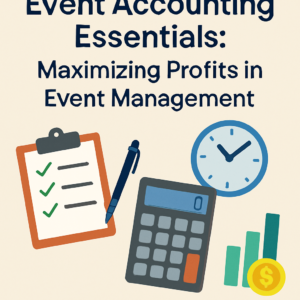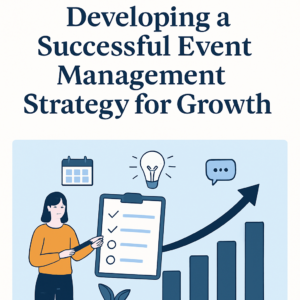Table of Contents
Starting and managing an event planning business can be exciting, but to ensure long-term success, you need a solid financial plan. Whether you’re launching a new venture or looking to optimize an existing one, understanding how to create a financial plan for an event planning business is crucial for growth and sustainability. In this guide, we’ll cover the key components, strategies, and tips for building a financial plan for your event management company.
Why Do You Need a Financial Plan for Your Event Planning Business?
Before diving into the steps, it’s important to understand why having a financial plan for your event management company is vital. A well-constructed financial plan helps:
Set clear financial goals: It allows you to track your business progress, forecast future revenues, and establish financial targets.
Manage cash flow: Since event planning can be a fluctuating industry, especially during off-seasons, managing cash flow is key to avoiding shortfalls.
Attract investors and secure loans: Investors and banks require a detailed financial plan to assess the profitability of your business before offering funds.
Make informed decisions: It helps you prioritize expenses, allocate resources effectively, and avoid overspending.
With that foundation, let’s break down how to create a financial plan for your event management business.
Setting Financial Goals and KPIs
Financial goals and KPIs are instrumental in guiding your event planning business toward sustained profitability. A well-structured financial plan for an event management company is essential to achieving these goals. Financial goals can range from increasing your revenue by a specific percentage to reducing operational costs. Setting KPIs within your event management financial plan allows you to measure your progress and ensure you stay on track.
Key metrics such as gross profit margin, cost per event, and ROI for marketing efforts are particularly useful. By consistently tracking these KPIs, you can gain valuable insights into your business performance and make informed decisions. This proactive approach will help you identify areas for improvement and optimize your financial strategy for better results.
Cash Flow Management Techniques
Effective cash flow management is vital for the success of your event planning business. One technique is to maintain a cash flow projection that details when you expect payments from clients and when you need to settle bills with suppliers and vendors. Understanding your cash flow cycle allows you to avoid shortages and plan for peak seasons or slow periods.
Additionally, consider negotiating favorable payment terms with clients and vendors to better align your receivables and payables. Implementing automated invoicing and payment reminders can also help expedite collections, ensuring a steadier cash flow. Regularly review your cash flow statements to identify patterns and make necessary adjustments to improve liquidity.
Expense Tracking and Control
Utilizing effective expense tracking and control measures is critical for maintaining the financial health of your event planning business. Begin by adopting robust accounting software or well-organized spreadsheets to monitor every expense related to your events. Break down your costs into categories like venue rental, catering, staff wages, marketing, and miscellaneous operational expenses. This categorization helps you pinpoint where your money is going and identify any areas of overspending.
Regularly scrutinize these expenses to uncover trends and potential cost-saving opportunities. For example, you might discover that certain suppliers offer better rates, or you might find bulk purchasing options that could reduce costs. Implement stringent approval processes for expenditures to ensure that every dollar spent is necessary and contributes to the event’s success.
Additionally, negotiating contracts and payment terms with vendors can lead to significant savings. By keeping a close eye on both fixed and variable costs, you can stay within your budget while maintaining the quality of your services. Continuous expense tracking enables you to make data-driven decisions, helping you refine your financial strategy and ensure resources are allocated efficiently.
Ultimately, diligent expense tracking and control are pivotal in optimizing your financial management, allowing your event planning business to thrive in a competitive market.
Financial Reporting and Analysis
Regular financial reporting and thorough analysis are vital for maintaining the financial health of your event planning business. Financial statements, such as profit and loss statements, balance sheets, and cash flow statements, offer critical insights into your business’s performance and stability. By reviewing these reports consistently, you can identify trends, assess the profitability of individual events, and pinpoint cost drivers that impact your bottom line.
Analyzing financial reports enables you to make data-driven decisions, highlighting areas where you can reduce costs or increase revenue. For instance, understanding which types of events generate the highest profit margins can inform your marketing strategies and resource allocation. Similarly, recognizing recurring expenses can help you negotiate better terms with suppliers or find more cost-effective alternatives.
Advanced financial analysis techniques, such as variance analysis, can further refine your understanding of your financial performance. By comparing your actual financial outcomes to your budgeted projections, you can determine where deviations occurred and understand the underlying reasons. This practice helps you adjust your financial strategies proactively, ensuring your business remains on a path to sustained profitability.
Incorporating regular financial reviews and detailed analysis into your business routine will provide you with a clear and accurate picture of your financial standing, empowering you to make informed decisions and optimize your financial management practices.
Adjusting Your Financial Plan Over Time
Your financial plan should be a dynamic document that evolves alongside your event planning business. Regular reviews are essential to ensure it remains aligned with your business objectives and market conditions. Utilize your financial reports and analysis to identify areas where actual performance deviates from projections. Investigate these variances to understand the underlying causes and adjust your strategies accordingly. For instance, if certain types of events are consistently underperforming, you might need to reevaluate your pricing, marketing, or resource allocation strategies.
Staying attuned to industry trends and economic shifts is also crucial. Factors such as changes in client preferences, new technologies, or economic downturns can significantly impact your financial projections. Being proactive in adjusting your financial plan allows you to mitigate risks and seize new opportunities as they arise.
Incorporate feedback loops into your financial management process. Regularly consult with your team to gather insights on operational efficiencies and potential cost-saving measures. Additionally, revisit your financial goals and KPIs periodically to ensure they remain relevant and challenging yet attainable. Flexibility and adaptability in your financial planning will help you navigate uncertainties and maintain a resilient and growth-oriented business.
Seeking Professional Financial Guidance
Navigating the financial complexities of your event planning business can be daunting, and seeking professional financial guidance can provide a strategic edge. A fractional CFO or a financial consultant offers expertise that can significantly enhance your financial planning efforts. These professionals bring an external perspective and specialized knowledge, enabling you to identify financial inefficiencies and opportunities that you might overlook.
By partnering with a financial expert, you can benefit from tailored advice on budgeting, forecasting, and cash flow management, ensuring that every financial decision is data-driven and aligned with your business goals. They can help you implement robust financial reporting systems, providing you with timely and accurate insights into your business performance. This level of financial oversight can be instrumental in navigating economic fluctuations and industry changes, allowing you to make proactive adjustments to your financial strategies.
Moreover, financial professionals can assist in refining your expense tracking and control measures, ensuring that you maximize profitability while maintaining the quality of your services. Their experience in negotiating with vendors and optimizing payment terms can lead to significant cost savings. Leveraging the expertise of a fractional CFO or financial consultant empowers you to focus on delivering exceptional events, knowing that your financial foundation is solid and well-managed.
Conclusion
Crafting a detailed financial plan is a strategic necessity for ensuring the longevity and success of your event planning business. This comprehensive approach involves more than just balancing books; it’s about creating a financial roadmap that guides every decision and action you take. By embracing robust budgeting and forecasting practices, setting clear financial goals and KPIs, and employing effective cash flow management techniques, you can position your business for sustained growth and stability.
Regular financial reporting and analysis offer the insights needed to make informed, strategic adjustments, keeping your business agile and resilient in a dynamic market. Seeking professional financial advisory service from Kommas with Kelle can further enhance your financial planning, providing specialized expertise and a strategic edge. Contact Kommas with Kelle today to help you navigate challenges, capitalize on opportunities, and ensure that your event planning business not only survives but thrives in a competitive landscape.









